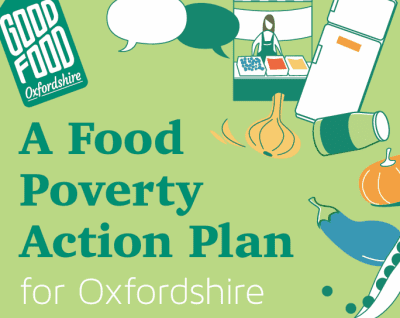Many regular visitors were deeply disappointed when this year's Oxford Real Farming Conference was moved online again at relatively short notice – not least the local traders who were going to provide catering stalls for the conference attendees. However, while an in-person conference would have been more engaging in many ways, the online format had the great advantage of being open to people from all parts of the world and, with more than 4000 attendees, reaching many more people than could have joined in person at the Oxford Town Hall.
The sessions covered a wide range of topics, many of which are highly relevant to farmers, growers and the wider food sector in Oxfordshire. Here are just a few examples that stood out for us:
Several sessions explored different aspects of agroecology, including a session on "Charting a Course that Works for All: Creating Pathways for Transition to Agroecology", and "Restorative Continuous Cropping Using Heritage Cereals: How To Produce All The Grain We Need Without Destroying The Planet". Sustain ran a session on "Scaling Up Peri-Urban Agroecology: Future Strategies, Policy And Practice".
Agroforestry was another topic of great relevance especially in the context of climate change mitigation and adaptation. The model project at Wakelyns presented their work in a session titled "Wakelyns Organic Agroforestry: Two Year Update: Short Food Chains and Stacking Enterprises". And GFO network member FarmED in West Oxfordshire have planted a tree library which they call a living agroforestry textbook. FarmED also co-hosted a session with Cotswolds Seeds on establishing and managing diverse herbal leys. The topics – agroecology and agroforestry – were brought together in a session on woodland grazing.
GFO co-hosted a lunchtime session on consumer awareness of the harm of pesticides and was featured on JackFM radio with an interview with GFO Co-ordinator Nina Osswald, local organic farmer George Bennett of Sandy Lane Farm and environmental Journalist Anna Turns. The interview and session highlighted the lack of awareness of the health risk that pesticides pose both to humans and to biodiversity and wider eco-system health. When deciding whether to buy organic food, consumers often tend to underestimate the importance of this issue as well as the health effects through the cocktail effect created created by multiple substance residues adding up. The session aimed to highlight that local organic and agroecological farms are an important answer to this problem in light of the lack of protection from legislation.
Ben Reynolds has written a review of local food retailing initiatives based on interviews with "the country's leading local food practitioners and champions at the Oxford Real Farming Conference. Read the full article Oxford’s Real Farmers take on retail: Looking at local food for 2022.
Alongside the conference, GFO hosted the annual network meeting for farmers, growers and other interested folks from Oxfordshire. It was a lively zoom meeting attended by over 30 people, most of them farmers and growers from around Oxfordshire. The GFO team presented an update on the process of co-developing a community food strategy for Oxfordshire which is currently underway. In breakout rooms and plenary, participants then discussed a variety of topics including challenges they face and opportunities around access to land for farming and growing.
Young growers, new entrants to farming and apprentice growers are a specific sub-group that was represented at the ORFC as well as the Oxfordshire network meeting. This group is crucially important for the future of a sustainable local farming sector, but it is not easy for them to get the support they need, from accessing land, finance and training opportunities to simply feeling the support of being part of a larger movement. The ORFC is a valuable opportunity to meet and catch up for them, and over the last year or so, a new informal network of farming apprentices and new growers has emerged in Oxfordshire.
If you would like more detailed notes from the breakout room on "How do we grow?", know an apprentice or young grower with under 5 years land working experience who would like to be added to a new farmworkers WhatsApp group, or are interested in curricula and farm visits for farmworkers, then please contact Dot.
There was discussion of the idea of a dynamic procurement system in Oxfordshire. This system has been successfully piloted by the South West Food Hub and there is potentially funding available for other regions. It would involve anchor institutions and other procurers committing to work with local producers using the network and a software solution to aggregate smaller suppliers’ goods and allow more access to bigger contracts, for instance for schools, universities etc. the local suppliers present could see the challenges setting this up could pose but were supportive of the initiative.
If your food business or organisation would like to be part of the Good Food Oxfordshire network, please consider signing the Oxfordshire Good Food Charter.



